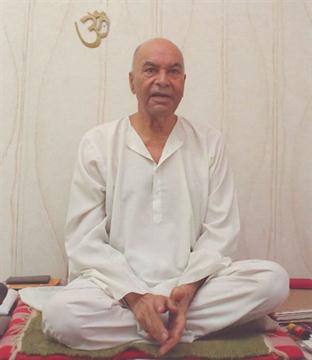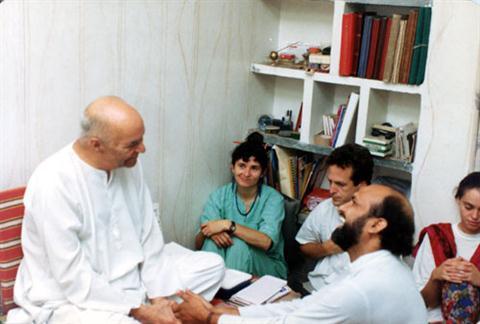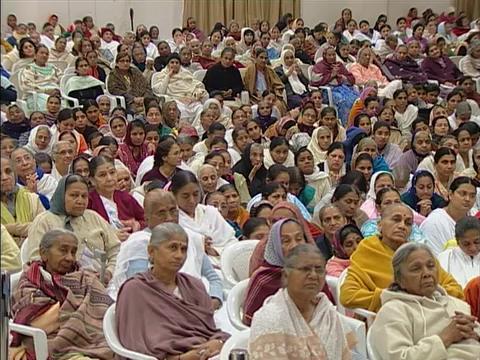Contents
- About Shri HWL Poonja ji / Papa ji
- About Satsang Bhavan
- Activities at the Satsang Bhavan
- Pictures
- Contact
- References
About HWL Poonja ji / Papa ji
Papaji was born in Gujranwalla, in western Punjab, which is now Pakistan. His mother was the sister of Swami Rama Tirtha, one of the most famous saints of India. In 1966 he retired and went again back to Lucknow, Having married off His children, Poonjaji was free to travel. He traveled throughout India, Europe and the Americas, teaching meditation, opening schools for children and giving Satsang. By the late 1980's, with His health causing Him to stay in Lucknow more, the "Westerners" found Him It was from His home and then His daughter-in-law's house where he gave Satsang, to an increasingly growing number of "seekers" from around the world, until a hall was built, Satsang Bhawan, to hold the 200-300 seekers daily who attended Poonjaji's Satsangs.
Childhood
At the age of eight, he experienced a state of intense happiness, joy and bliss and could not talk nor communicate for days. This, he realized later on, was the experience of the SELF. He was persuaded by his mother that he could reconnect to this experience by practicing devotion to the God Krushn, and so he gave himself over to Krushn Bhakti (devotion) with vigor. He proved to be a prodigy of sorts and while still a boy he began to have visions of Krushn, so strong that he could physically touch him. This is known in the Vaishnava tradition as receiving the "Darsana" of God. Playfully interacting with His visions of Krushn while simultaneously experiencing the bliss of spiritual union, he spent his youth in intimate relationship with Krushn as His Friend.
Adulthood
As an adult he led an apparently normal life, married, raised two children and even joined the British army, while secretly His love for Krushn (and His visions of Him) continued. Pursuing the life of a devotee he was not satisfied with having sporadic visions and was deeply troubled when Krishna did not appear. He became obsessed with a longing to have the experience of seeing God all the time, and traveled throughout India asking sages if they could show Him god.
Meeting Ramana Maharshi
After all his attempts had failed, he returned to his family in Lyalpur. A sadhu appeared at the door soon after that, and Poonjaji invited him in and asked him the question he had asked swamis throughout the country: "Can you show me God? If not, do you know of anyone who can?" To his surprise, the sadhu told him that there was a person, Ramana Maharshi, who could show him God. Further, the sadhu provided detailed instructions on how to find this Ramana Maharshi at Tiruvannamalai in southern India. At the soonest opportunity, Poonjaji traveled to Tiruvannamalai to meet the sage Ramana Maharshi. It was 1944, and Poonjaji was thirty-one years old. In His first visit with Ramana, Papaji told Him that he could no longer bring his mind to think of God, do japa or any other spiritual practice. Deeply concerned, he asked Ramana for help and was told that this was not a problem, that all his practice had carried him to this moment and it could be left behind now because it had served its purpose. On hearing this and bathing in the silent gaze of his guru, Poonjaji felt his body purified and remade atom by atom, totally transforming him as if he were being given a new body one atom at a time and he saw inside His heart, the Spiritual heart and inside that a bud, opening, the flowering of His Spiritual heart. However, this was not enough to convince Papaji that Ramana could "show Him god'. So Poonja went to the Adiannamalai side of the mountain and spent His time playing with his Krishna.
Realization
At the end of the period with Ramana Maharshi, When Papaji came to say goodbye to Ramana before leaving to return to Madras, Ramana pointed him in the direction of his own Self. He pointed out that gods who appear and then disappear are not continuous, only the One who was aware of those gods was continuous. He encouraged Poonjaji to find the One who had seen the Visions of God because that One ( Consciousness ) does not come and go. He told Poonjaji to find out who the seer is. Poonjaji had a deeply profound experience when he heard this, and under Ramana's gaze he suddenly understood what he was and always already had been. He became aware of the SELF, and that he, Poonjaji, was the same Self as Ramana.
After his transformation he stayed in southern India until 1947, when during the partition of India, despite Poonjaji's fierce longing to stay with His master, Ramana sent him to his old home in the Punjab (then in the new country of Pakistan) to bring His family to the safety of Lucknow, India. Ramana's last words to Him were: “I am with you wherever you go.”
In the following years, Poonjaji worked to earn money to support his family, while seeing devotees and traveling as his jobs required.
A Teacher
When Papaji was young, he used to impersonate and follow the teachings of Lord Buddha, a small story related to it is here.
Papa ji loved Lord Buddha, he used to follow his ideals, acts and used to impersonate him, he once told a story about him falling in Love with Lord Buddha, and story is in his own words:
His mother only had three saris. One day, fairly soon after he had taken the white one, she washed the other two and started looking for the third because she needed to wear it. Of course, she couldn’t find it anywhere. She never asked him about it because, since he was not a girl, it did not occur to her that he might have had any possible use for it. She eventually decided that she must have given it to the dhobi, and that he had lost it or forgotten to return it.
One of the famous of his Buddha impersonations came when he discovered that he used to preach sermons in public places. This excited papaji because it was a new facet of his life that papaji could copy. He knew absolutely nothing about Buddhism, but the thought that this might be a handicap when papaji stood up to preach never occurred to him.
There was a clock-tower in the middle of the town and near it was a raised platform where all the local politicians used to give their speeches. It was very much the centre of Faisalabad because all the routes to other towns radiated out from it. Papa ji put on his usual disguise, strode confidently up the steps, and began to give his first public speech. He could not recollect anything that he said—it couldn’t have been anything about Buddhism because he knew absolutely nothing about it—but papaji did remember that he delivered his speech with great flair and panache. He harangued the passers-by with great gusto, occasionally raising his arm and wagging his finger to emphasize the points he was making. He had seen the politicians gesture like that when they made their speeches.
He felt he had made a successful start to his oratorical career and taken a step further towards his goal of imitating the Buddha in everything he did. He went back to the clock-tower on several occasions and preached many sermons there. Unfortunately, Faisalabad was not a big city and it was inevitable that sooner or later someone who knew him and would recognize him. It was not surprising, therefore, that one day one of his neighbors spotted him and reported his antics to his mother.
At first she was very skeptical. ‘How can it be he?’ she asked. ‘Where would he get an orange robe from?’ Then, remembering her missing sari, she went to the cupboard where he kept his books and found the paper parcel. The game was over, for that discovery effectively ended his brief career as an imitation Buddha.
It was an absurd but very entertaining episode in his life which, in retrospect, he can see as reflecting his state of mind at the time. He had this intense yearning for God but he had nothing to channel it into except the external forms of the deities. Something in him recognized the Buddha as divine and his childish and ignorant attempts to follow in his footsteps were merely a manifestation of that burning inner desire to find God. Papa ji wasn’t being mischievous. He never regarded it as some kind of childhood prank. Some power was compelling him to do it. Some old samskaras were coming up and compelling him towards reality, towards the truth of the Self. It was a serious attempt on papa ji’s part to find his way back to the state of happiness and peace that he had once experienced and known as his own inner reality.
Hi mother did not get very angry with him. They had always had a good relationship and she could see the humor of the situation. Because she had been so young when papa ji was born, they behaved with each other as if they were brother and sister, rather than mother and son. They played, sang and danced together, and quite often they even slept in the same bed.
On 6th September, 1997 Papaji passed away in the intensive-care ward of a Lucknow hospital, having succumbed to what the doctors there called ‘acute respiratory failure'. Papaji was cremated the following day and his ashes were immersed in the Ganga a few days later by Surendra, his son, and by the devotees who accompanied him.
Though his health had been poor for some time, Papaji continued to give regular public Satsangs till 25th August (Krishna Janmashtami), and the never-ending stream of devotees was made welcome at his home until a severe attack of viral fever, bronchitis and asthma forced his admission to hospital on 2nd September.
About Satsang Bhavan
Satsang Bhavan is an open house, a meeting place for lovers of freedom and peace.
It has a common hall where Papaji gave satsang is available to accommodate gatherings of truth and celebrations of Peace and Freedom. Videos of Papaji and Yoga sessions take place in this hall, So full with His Presence. On the roof of Satsang Bhavan the satsangis have their meals in “The best organic restaurant on the planet”. The room where Papaji met with people before and after Satsang has been kept as it is and is available for people to just BE and to Keep Quiet.
Satsang Bhavan also has a direct vertical
AVADHUTA
Papaji's official Avadhuta Foundation was established in 1993 to catalog, preserve, and make available to the public, information about the Indian teacher and guru, HWL Poonja, affectionately known as Papaji, and also that of his beloved teacher, Sri Ramana Maharshi. It functions both as a library and bookstore to loan, sell, and distribute books, tapes, DVDs, CDs, photos of Poonjaji and Sri Ramana. We are dedicated as stewards of Papaji's message to faithfully present his teachings. This requires that we are true to his words and that we present them as accurately and purely as possible.
*The word Avadhuta comes from an Indian term Avadhoot for one who has "shaken off" or "passed beyond" all worldly attachments and cares, including all motives of detachment (or conventional and other-worldly renunciation), all conventional notions of life and religion, and all seeking for "answers" or "solutions" in the form of conditional experience or conditional knowledge. (Quoted from The Avataric Samrajya of Adidam.)
"Now is the time to have a direct introduction to this moment. This moment is free of time, of mind, of any notions...introduce yourself to this moment."
The Avadhuta Foundation was established as a non-profit organization - to further the teachings of Sri H.W.L. Poonja, affectionately referred to as Papaji.
As a disciple of Sri Ramana Maharshi, the renowned Indian saint & sage who died in 1950, Papaji offered to speak about what he had experienced with his teacher.
Tens of thousands of people from all over the world visited Papaji, especially in Lucknow, his home, during the last years of his life. Seekers of truth from around the world visibly woke up in his presence. He had an extraordinary ability to seemingly transmit the experience of what has always been true and present: You are that!
Activities at Satsang Bhavan:
The daily schedule is:
• 10.00 a.m.
ARTI in SATSANG HALL
• 10.00 a.m. - 11.00 a.m.
BREAKFAST
• 11.00 a.m.
SATSANG with PAPAJI
• 1.30 p.m. - 2.30 p.m.
LUNCH
• Sunset
EVENING ARTI & HOMAM in BRINDAVAN FARM
• 5.00 p.m. - 6.00 p.m.
BHAJANS & CHANTING - EVERY THURSDAY in SATSANG HALL
• 7.30 p.m. - 8.30 p.m.
DINNER
Pictures
 1papajisitting
1papajisitting
 2papajiwithdevotees
2papajiwithdevotees
 3gueshouseaccomodationforsatsangis
3gueshouseaccomodationforsatsangis
 4satsang
4satsang
Contact
Satsang Bhavan,
A 306, Indira Nagar,
Lucknow,
226 016,
Phone: 91-522-381189.
